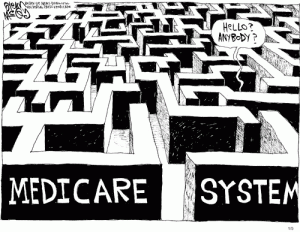A conversation with Dr. Al Power about memory care.
By Denise Boudreau-Scott
A few months ago my phone rang and on the other end was my friend, Dr. Al Power. Stuck at the airport in New Jersey and hungry for lunch he took a chance and reached out for me to meet him. As luck would have it, I was free and I wound up having one of the most interesting conversations I’ve ever had. Thank you Newark Airport!
Dr. Al Power
If you aren’t familiar with Dr. Power, he is a board certified internist and geriatrician, clinical associate professor of medicine at the University of Rochester, and a Fellow of the American College of Physicians / American Society for Internal Medicine. He is the author of Dementia Beyond Drugs: Changing the Culture of Care and Dementia Beyond Disease. Most importantly, his name has no “s” at the end. A mistake I frequently make and that he chastises me for. PoweR not PowerS!
Our conversation began with Al stating memory care neighborhoods are really just another phrase for segregated living. I inquired why he felt this way and his thought provoking reply was, “This is a civil rights issue. We are saying there is a group of people who can’t live around anyone else because they are different.” He continued on, “We’ve been down that road, and we know that putting physical attributes before them as people not only is discriminatory, but it also stereotypes those individuals.”
Prisoners
As he talked I got to thinking about what other populations we isolate in the United States. The one nagging question that kept swirling around my brain as I listened to him was, “Is there anyone else we segregate?” I was shocked by the answered question in my head. I delivered my answer to Al at the exact same second that Al delivered his answer to me, “Prisoners.”
I flashbacked to when I visited Alcatraz, the famous, defunct maximum security prison in California, and how I was struck by the rules on the wall that seemed eerily similar to the rules we have in long term care. What time a person wakes, eats and sleeps. What they eat. What they bring into their living space. All of these are governed in a prison — and most long-term care and senior living communities. If you think that’s not true I encourage you to visit your organization around 5 AM and just observe. I hope that your organization is different. My experience tells me it’s probably not. In fact I would almost guarantee it. Even if you offer flexible options, the sad fact is that the majority of residents, in both nursing homes and assisted livings, feel compelled to follow your “institutional” schedule.
Labels
Al told me about an exercise he does with some of his groups where he invites each person to identify one personal characteristic about him/herself. Race, religion, ethnicity, etc. Go ahead and try it. Isolate one attribute for yourself. For example, I’m Irish. Now apply the labels that we apply to people with dementia. “We think they’d be better living with their own kind.” “They frighten us.” “They like to do things together as a group.” “I think it’s better off if they are not around us.” Imagine if someone said to me, “I think the Irish would be better off living with their own kind,” or “the Irish frighten me.” I’d be unbelievably offended, not to mention I would probably give them something to be frightened about!
When we apply these phrases to people outside of those with dementia, and there are many people in our world that do just that to a variety of groups, it’s incredibly offensive. As my dear fried Holly Argent Tariq, CEO (or as she likes to call herself, Servant of the People) at St. Mary’s Home in Manhattan shares, “How often do we look at the label of the resident instead of the person wearing the label? As we develop person centered care we should be mindful that behaviors can be symptomatic of a myriad of conditions. Take, for example, the resident who has had a stroke. They may exhibit angry outbursts, cursing, fighting and other aggressive behaviors. Do we segregate them from other residents? What about the survivor of a traumatic brain injury?”
Holly reflected, “They are both often left with impulse control behaviors similar to those of a resident with dementia. However in spite of the different diagnosis, their similar behaviors respond well to similar interventions. We who are human beings have needs no matter who we are or what condition we are in. We need the basics; food, clothing and shelter as well as comfort, company, and compassion. We need socialization.”
Individualized Care
During our conversation I asked Al to talk to me about person centered care and dementia. He shared, “One of the things about living in an area that is focused on just one disease, it is ironically not about individualized care. You are focusing on dementia in general.” He informed me that there are over 100 different types of dementia, something that I was not aware of previously. Al also told me that he knows of no clinical proof that memory care neighborhoods improve the quality of care.
Not all memory care neighborhoods perform poorly. There are communities with specialized areas that provide great care and support to people living with dementia, and those without them that don’t do such a great job. However, too often a locked door is thrown up at the end of a corridor and the area is supposed to be magically transformed. I’ve visited some of these memory care or dementia units, as they are often called. I have left weeping and feeling desperate for the people being confined, fully knowing that if I lived there I wouldn’t last a day without needing a behavioral intervention. I’d be banging on furniture, throwing things and lashing out at people. A long straight corridor, lined on both sides with sterile bedrooms and a “day room” that warehouses my fellow residents and I just wouldn’t cut it for me. I’d imagine it doesn’t fulfill the needs of most humans.
Generalized Care
Holly shared with me a story about a Talent Show in the nursing home she serves, “We have a resident with a TBI who is a poet. He dictated his poetry and had another resident read it for him. He has terrible temper outbursts and bangs on the table when he wants something. We know him, and the other residents know him, and he is redirected, or left alone when he has these moods. How sad for him and us if he were segregated. Another resident with severe cognitive impairment sang, Karaoke style, ‘Let It Be’, by the Beatles. She is usually in a world of her own, but our creative arts program enables her to be a member of the community. Dementia brings with it special challenges for the resident and the caregiver. I support mixed areas and submit that the benefits of having people living together enriches the lives of all involved.”
I encourage you to take a hard look at what a typical day is in your specialized areas. It’s easy to get defensive and say, “That doesn’t happen in my organization!” Is your area a place where you would want to live? A place where you can imagine your mother or spouse living a life full of meaning and purpose? Or, as my former veterinarian would say, “Is it a pound for old people instead of dogs?” Harsh words that sadly accurately reflect the reality of too many people living with dementia.








